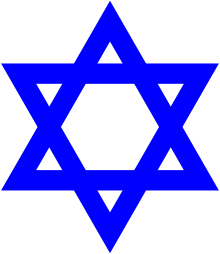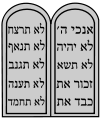Orthodox Judaism outreach
| Part of a series on |
| Judaism |
|---|
   |
|
Other religions
|
|
Related topics |
|
| Part of a series on |
| Jewish outreach |
|---|
| Denominations |
| Other topics |
Orthodox Jewish outreach, often referred to as Kiruv or Keruv (Hebrew: קירוב , קֵרוּב "bringing close"), is the collective work or movement of Orthodox Judaism that reaches out to non-Orthodox Jews to encourage belief in God and to live according to Orthodox Jewish law. The process of a Jew becoming more observant of Orthodox Judaism is called teshuva ("return" in Hebrew) making the "returnee" a baal teshuva ("master of return"). Orthodox Jewish outreach has worked to enhance the rise of the baal teshuva movement.
Varieties
Haredi
The late 1960s and early 1970s saw the founding of the non-Hasidic, Haredi institutions that eventually became the Aish HaTorah, Ohr Somayach, and Machon Shlomo yeshivas.
Rabbi Noah Weinberg was one of the pioneers of this movement with Aish HaTorah. Ohr Somayach has also played a major role in the baal teshuva movement through its education of generations of students.
Other baal teshuva yeshivas for men include the Diaspora Yeshiva, founded by Rabbi Mordechai Goldstein in Jerusalem's Old City in 1967,[1] and Dvar Yerushalayim, established in 1970. Baal teshuva yeshivas for women include Neve Yerushalayim, founded in 1970, and EYAHT, affiliated with Aish HaTorah and founded in 1982.
Concurrent with the opening of baal teshuva learning programs in Israel in the 1970s, a small number of Orthodox outreach workers began approaching English-speaking, college-age students visiting the Western Wall and inviting them to experience a Shabbat meal with a host family or to check out one of the baal teshuva yeshivas. These outreach workers included Rabbi Meir Schuster, Baruch Levine, and, beginning in 1982, Jeff Seidel.[2][3][4]
Modern Orthodox
Within Modern Orthodox Judaism, the Union of Orthodox Congregations created the National Conference of Synagogue Youth (NCSY) to reach Jewish teenagers in public schools. Founded by Rabbi Pinchas Stolper the movement also developed its in-house literature geared to the newly observant mainly written by Rabbi Aryeh Kaplan.
NJOP
In 1987, an organization called National Jewish Outreach Program (NJOP) was founded by Ephraim Buchwald.
Chabad
Rabbi Yosef Yitzchok Schneersohn, 6th leader of the Chabad-Lubavitch branch of Hasidic Judaism, and then his successor, Rabbi Menachem Mendel Schneerson were responsible for turning Chabad's activities toward outreach. Each in turn sent out rabbinic emissaries, known as "Shluchim", and their wives to settle in places across the world solely for the purpose of teaching those who did not receive a Jewish education or to inspire those who did. The vehicle chosen for this was termed a "Chabad house."
Chabad has been active in reaching out to Jews through its synagogues, and more direct outreach efforts, such as its Mitzvah tanks. The organization has been recognized as using free holiday services to reach out across denominations.[5]
Organizations
Association for Jewish Outreach Programs
The Association for Jewish Outreach Professionals (AJOP) was established in 1987 to unite and enhance the work of outreach rabbis and their wives.
Kiruv Organisation
The Kiruv Organisation was founded in 1995 by Yossef Mizrahi in New York for the purpose of connecting Jews to Judaism and Torah, and teaching musar.[6]
Project Genesis
Project Genesis is a Baltimore-based kiruv effort to increase the numbers of baalei teshuva.
Jewish women
United States
Esther Jungreis is the founder of the international Hineni movement in America.
Israel
- Neve Yerushalayim, founded in 1970 in Jerusalem, is an Orthodox school for secular Jewish women seeking a college-level introductory program. Its founder and guiding dean is Rabbi Dr. Dovid Refson. Rebbetzin Tziporah Heller is a teacher at the school.
- EYAHT College of Jewish Studies for Women, a subsidiary of Aish HaTorah, was founded in Jerusalem in 1982 by Denah Weinberg, wife of Aish HaTorah founder Noah Weinberg.
- Machon Chana of Crown Heights (founded 1972), Bais Chana Women International (formerly of Minnesota) are Lubavitch women's yeshivos which have taught thousands of Jewish women who are beginners in their knowledge of Judaism.
Day schools
Torah Umesorah: The National Society for Hebrew Day Schools was founded by Rabbi Shraga Feivel Mendlowitz. It is an American Orthodox organization which has opened hundreds of day schools and provides resources to many different Orthodox Jewish day schools. It has an outreach effort called Partners In Torah whereby volunteer Orthodox men and women learn on the phone for an hour a week with a non-Orthodox study-partner. A similar program run by Chabad is called Jnet. Torah Umesorah also sponsors the SEED Program whereby young Yeshiva students spend a few weeks during their summers teaching, this is similar to the Chabad Lubavitch "peace corps" which are Yeshiva-student pairs that visit remote Jewish communities over the summers to help develop Jewish communities by teaching.
Rabbis
- The following lists are not meant to be definitive, they are just a sampling of prominent personalities mainly in Israel and America.
Haredi (non-Hasidic)
- Rabbis Mordechai Becher and Jonathan Rietti, senior lecturers at Gateways.
- Rabbi Yitzchak Berkovits. Founder and Rosh Kollel The Jerusalem Kollel, Former Mashgiach ruchani of Yeshivas Aish HaTorah
- Rabbi Avigdor Miller. Congregational rabbi, one of the first writers of books on Jewish philosophy for today's seeker, and former mashgiach ruchani ("spiritual supervisor") in Rabbi Hutner's Chaim Berlin yeshiva in Brooklyn. Renowned for his over 2,500 taped lectures disseminated amongst, and influencing, many Jews; religious and non-religious alike.
- Rabbi Dr. Dovid Refson. Founder of Neve Yerushalayim seminary for women.
- Rabbi Yaakov Rosenberg. Founder of Machon Shlomo yeshiva.
- Rabbi Nota Schiller. Co-founder and rosh yeshiva of Yeshivas Ohr Somayach.
- Rabbi Pinchas Stolper. Founder and builder of the Orthodox Union's NCSY youth outreach division.
- Rabbi Akiva Tatz. Himself a baal teshuva, author of books explaining Judaism in-depth and in modern terminology, and popular lecturer.
- Rabbi Mendel Weinbach, co-founder and rosh yeshiva of Yeshivas Ohr Somayach.
- Rabbi Noah Weinberg. Founder and dean of Yeshivas Aish HaTorah and its worldwide educational outreach network.
Hasidic
- Rabbi Nachman Bulman. Pioneer educator, orator, author, translator, and builder of Jewish communities in America and Israel; later a dean of Yeshivas Ohr Somayach.
- Rabbi Dovid Gottlieb. A baal teshuva himself and a Bostoner Hasid, author and lecturer at Yeshivas Ohr Somayach.
Chabad-Lubavitch
- Rabbi Shlomo Cunin. Prominent leader of Chabad activities in California. Directed the first Chabad House.
- Rabbi Manis Friedman. Notable Chabad thinker and lecturer. Dean of an important women's seminary for newly-religious women.
- Rabbi Yitzchok Dovid Groner. Pioneer and builder of the Melbourne Australian Jewish community through Jewish outreach activities.
- Rabbi Moshe Kotlarsky. Roving Chabad rabbi and noted speaker. Directs development of the global Chabad-Lubavitch emissary network.
- Rabbi Shimon Lazaroff. Head Shliach for Chabad Lubavitch in Texas and executive board member of Agudas Chasidei Chabad.
- Rabbi Menachem Mendel Schneerson (1902–1994). The seventh Rebbe of Chabad Lubavitch hasidism. He established a vast international educational, outreach, and community-building movement. In over 40 years, he inspired about 5,000 young men and women to become rabbis and rebbitzins (a name for a rabbi's wife) as his personal emissaries all over the world, with the goal of exposing and attracting non-religious Jews towards Judaism, as well as opening schools, mikvehs, synagogues, yeshivahs, etc. This campaign has had notable success, as a large portion of Lubavitch hasidim today are baalei teshuvah or children of baal teshuva parents. After Schneerson's death in 1994 his hassidim continue his work and hundreds of new emissaries continue to leave for even the remotest places.
Modern Orthodox and Religious Zionist
- Rabbi Ephraim Buchwald. Founder of NJOP, National Jewish Outreach Program.
- Rabbi Shlomo Carlebach. The "Singing Rabbi", composer and performer of many now-popular Jewish religious songs.
- Rabbi Meir Kahane. Founder of the Jewish Defense League. Rabbi Kahane dedicated much his activism and writings to helping preserve Jewish identity, reaching out to Jews and fighting intermarriage and assimilation. His bestseller "Why Be Jewish?" motivated countless Jews to return to their Jewish roots.[7]
- Rabbi Aryeh Kaplan. Translator of Torah literature into modern English, notably The Living Torah and Nach, and author of booklets and books used for both introductory and in-depth presentations of Judaism.
- Rabbi Abraham Isaac Kook (1864–1935). Chief rabbi of the British Mandate of Palestine and also regarded symbolically by the latter State of Israel as its first chief rabbi as well. He was steeped in Kabbalah, Talmud, and philosophy. He was regarded as a guide to the Mizrachi Religious Zionist movement, and an advocate of urgent Jewish emigration (aliyah), to then Palestine before the Holocaust. He won much trust of the secular Jewish leadership in London, Europe, and Palestine, and argued that a warm and positive outlook to the secular pioneers (halutzim) would win loyalty and greater respect for Orthodox Judaism.
- Rabbi Shlomo Riskin. Founder of the outreach Lincoln Square Synagogue in Manhattan, Chief Rabbi of Efrat and Dean of Ohr Torah Stone Institutions, Israel.
See also
- Baal teshuva movement
- Conversion to Judaism
- Kiruv Organisation
- List of Baalei teshuva
- Repentance in Judaism
References
- ↑ Lange, Armin; Diethard Romheld, K. F.; Weigol, Matthias (2011). Judaism and Crisis: Crisis as a catalyst in Jewish cultural history. Vandenhoeck & Ruprecht. p. 330. ISBN 3525542089.
- ↑ Winer, Todd (9 February 1996). "'Hunter' at Kotel Seeks Shabbat Dinner Guests". Chicago Jewish News. Retrieved 17 June 2015.
- ↑ Rossoff, Dovid (2001). Where Heaven Touches Earth: Jewish Life in Jerusalem from Medieval Times to the Present (Revised ed.). Feldheim Publishers. p. 537. ISBN 0873068793.
- ↑ Pensak, Margie (27 December 2014). "BJL Exclusive: Jeff Seidel and Yohanan Danziger Miraculously Escape Jerusalem Arab Stoning Unharmed". Baltimore Jewish Life. Retrieved 17 June 2015.
- ↑ Fishkoff, Sue. "‘Praying without paying’ becoming a more popular option among shuls", Texas Jewish Post. Accessed September 22, 2007. "Many people credit Chabad-Lubavitch with spearheading the movement for free holiday services across the denominational spectrum."
- ↑ Hebrew Musar (מוּסַר), from the book of Proverbs 1:2 meaning moral conduct, discipline, instruction.
- ↑ Caviness, Rochelle. "Why Be Jewish? Intermarriage, Assimilation, and Alienation". The Jewish Eye.